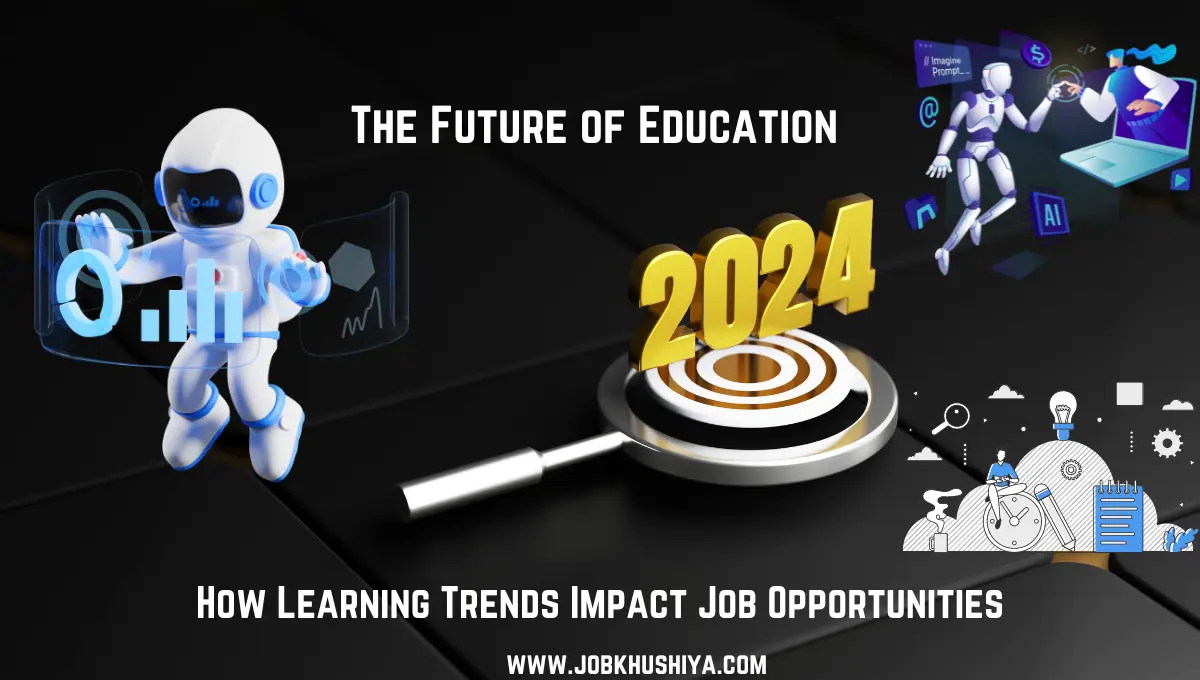Introduction:
In the rapidly evolving landscape of education and job markets, staying ahead of learning trends is crucial for securing future job opportunities. As we navigate through 2024 and beyond, the interplay between education and employment continues to shape the professional landscape in profound ways. This blog explores the key learning trends influencing job opportunities in 2024 and offers insights into how individuals can harness these trends to advance their careers.
Current Educational Landscape:
The year 2024 marks a pivotal moment in education, characterized by transformative shifts in how knowledge is acquired and applied. Traditional classroom settings are increasingly complemented by online learning platforms, offering flexibility and accessibility to a diverse global audience. The rise of digital learning tools, augmented reality (AR), and virtual reality (VR) simulations are revolutionizing traditional teaching methods, making education more interactive and engaging than ever before.
The Future of Education 2024: How Learning Trends Impact Job Opportunities
1) Impact of Technological Advancements:
Technological advancements continue to redefine the skills demanded by employers across various industries. Fields such as artificial intelligence (AI), machine learning, and data analytics are witnessing unprecedented growth, creating a high demand for skilled professionals. Educational programs focusing on these emerging technologies not only equip learners with relevant skills but also enhance their employability in a competitive job market.
2) Emphasis on Lifelong Learning:
In 2024, the concept of lifelong learning has become integral to career development. Rapid technological changes necessitate continuous upskilling and reskilling to remain relevant in one’s profession. Individuals are encouraged to embrace a growth mindset, actively seeking opportunities to acquire new knowledge and adapt to evolving industry trends. Online courses, micro-credentials, and industry certifications offer flexible pathways for professionals to stay abreast of the latest developments in their fields.
3) Diversity and Inclusion in Education:
The pursuit of inclusive education remains a cornerstone of progressive learning environments in 2024. Educational institutions and employers alike are prioritizing diversity, equity, and inclusion initiatives to foster a more representative workforce. Efforts to promote cultural awareness, accommodate diverse learning styles, and eliminate barriers to education are creating pathways for underrepresented groups to thrive academically and professionally.
4) Globalization and Remote Work:
The advent of remote work has reshaped traditional notions of employment, enabling professionals to work from virtually anywhere in the world. This trend has profound implications for education, as institutions increasingly cater to a global audience through online courses and virtual collaborations. Cross-cultural competencies and digital fluency are prized skills in a globalized economy, offering individuals opportunities to engage with international markets and diverse professional networks.
5) Future-Proofing Careers Through Soft Skills:
While technical skills remain crucial, the value of soft skills such as communication, critical thinking, and adaptability cannot be overstated in 2024. Employers seek candidates who can navigate complex challenges, collaborate effectively in diverse teams, and demonstrate resilience in the face of uncertainty. Educational programs emphasizing the development of these interpersonal skills empower individuals to succeed in dynamic work environments and future-proof their careers against evolving industry trends.
6) The Role of Mentorship and Networking:
In the competitive job market of 2024, mentorship and networking play pivotal roles in career advancement. Mentorship programs connect learners with seasoned professionals who provide guidance, insights, and industry-specific knowledge. Networking events, both virtual and in-person, facilitate meaningful connections and career opportunities. Building a robust professional network not only enhances job prospects but also fosters continuous learning and personal growth.
Conclusion:
As we look ahead to the future of education in 2024, the convergence of learning trends and job opportunities presents a landscape ripe with possibilities. Embracing technological advancements, committing to lifelong learning, promoting diversity and inclusion, and honing essential soft skills are pathways to success in a rapidly evolving professional world. By staying proactive, adaptable, and engaged in ongoing education, individuals can position themselves as agile contributors to the workforce of tomorrow.
In summary, the future of education in 2024 is characterized by innovation, accessibility, and a steadfast commitment to preparing individuals for the careers of tomorrow. By harnessing the transformative power of learning trends, professionals can navigate uncertainties with confidence and seize opportunities for personal and professional growth.
